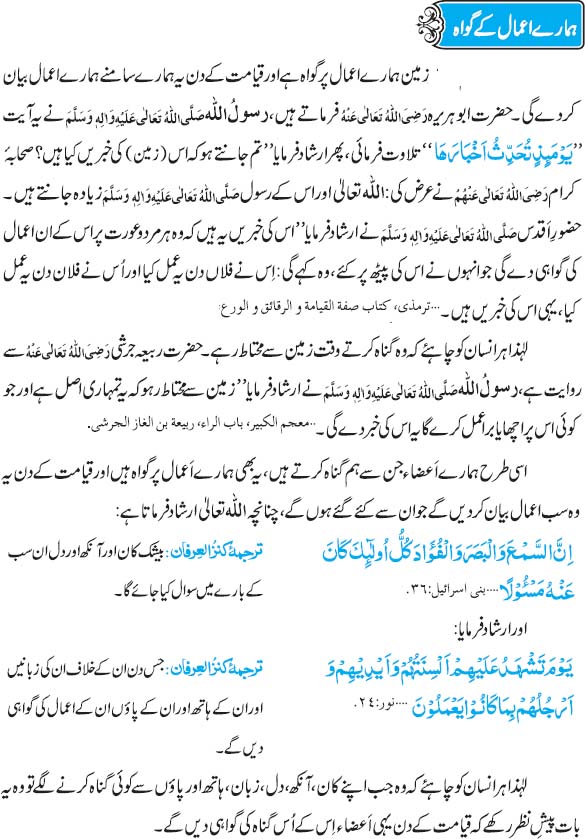
Hamare Aamaal Kay Gawah
October 2025
Death And Hereafter In Islam
“Every soul shall taste death. Qur’an 29:57
Death is Near
“Wheresoever you may be, death will overtake you, even if you are in fortresses built up strong and high!” Qur’an 4:78
Death is the reality from which none can escape. It draws nearer every day; every hour; every minute. According to the CIA’s The World Factbook, almost two people die each second. That’s a staggering 57.9 million people each year! Every single being will reach this inescapable fate, regardless of their age, health, background, social status, or piety. Where are the past kings, the billionaires, and the powerful? Where are the once beautiful, the famous, and the intellectual elite?
The Reality of Death
Death is not a disaster, but simply a passing from this world to the next. It should make us reflect and ponder about the purpose of life, and what will become of us after death.
Allah (God) has informed us in the Qur’an that He has created us with the purpose of worshipping Him alone and that He made this life a test to see who will fulfil that purpose: “And I did not create the Jinn and mankind except to worship Me. Qur’an 51:56
God has also informed us of the purpose behind the creation of death and life: “Allah is He who created death and life to test you as to which of you is best in deed.” Qur’an 67:2
One does not prepare for death by pre-paying funeral services or selecting a coffin in advance. It is about fulfilling one’s purpose in life – to worship Allah alone, to live according to His commandments, and perform good deeds. The concept of worship in Islam is all-encompassing and is not merely restricted to praying. In fact, any action that is pleasing to Allah is considered an act of worship, and a person will be rewarded for it.
O Nafs
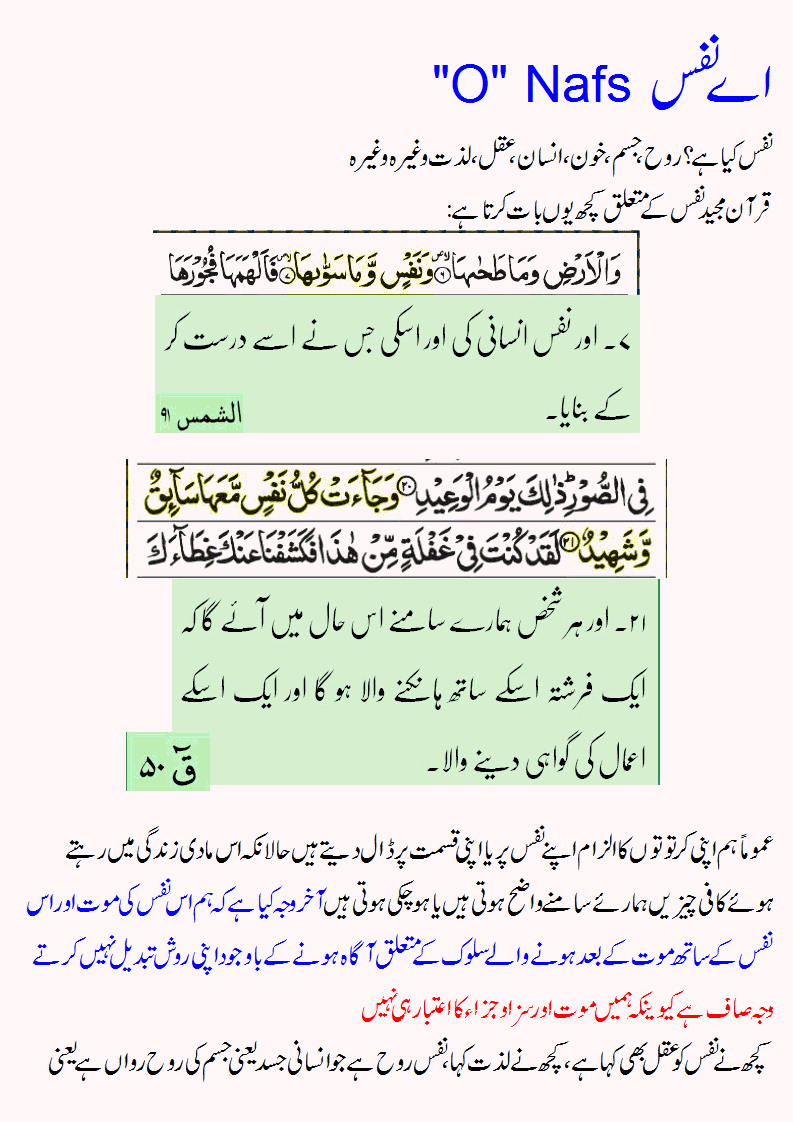
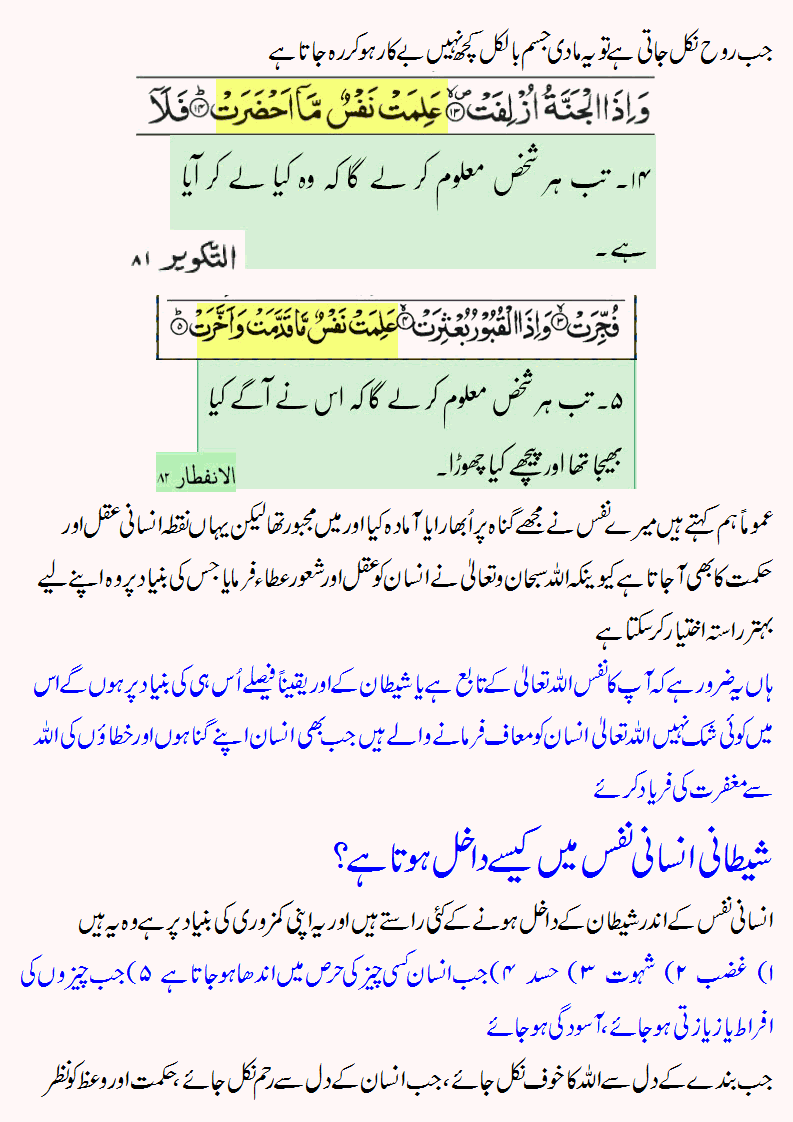
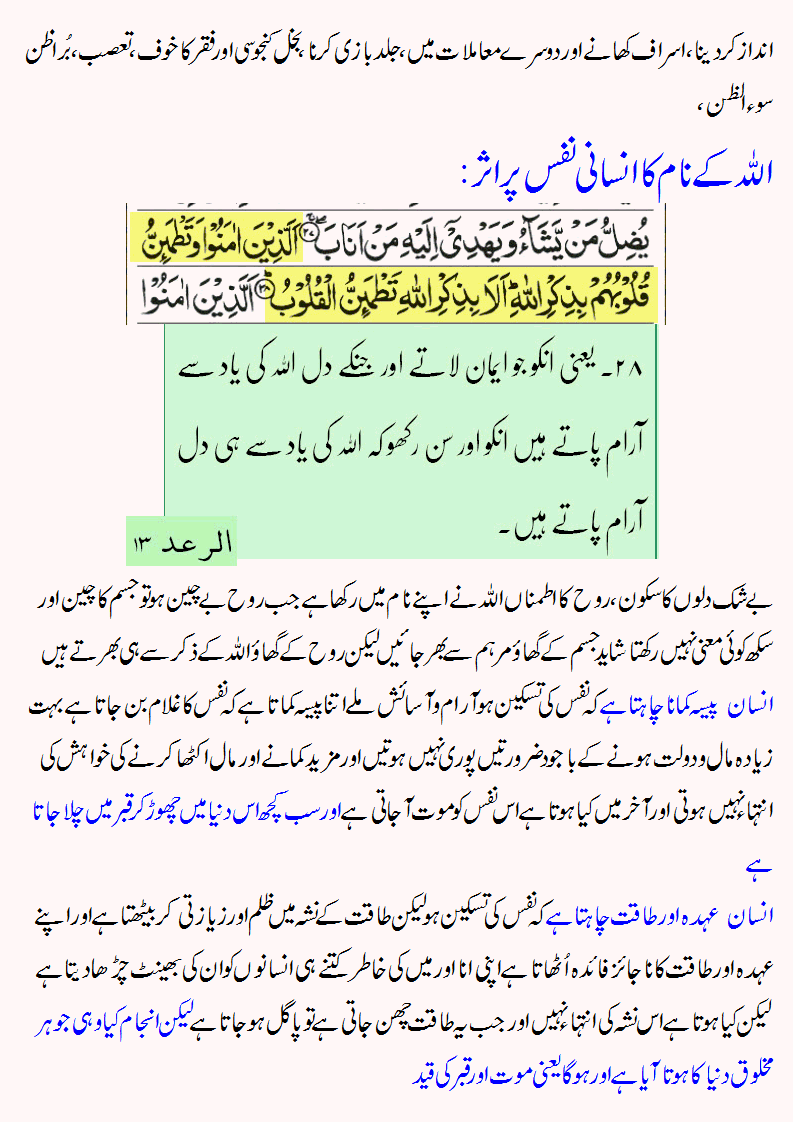
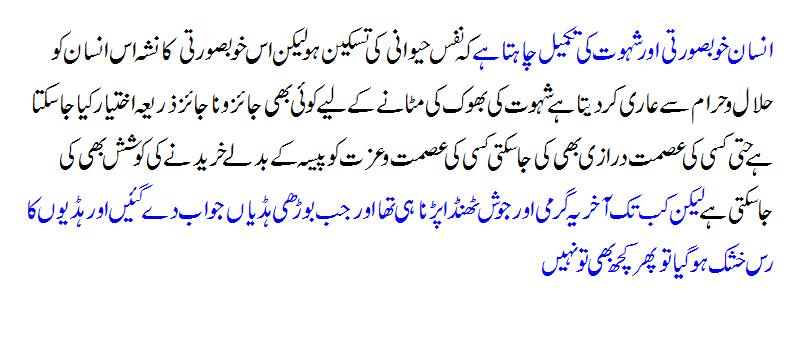
O Nafs (Nafs kya hai? Rooh, Jism, Khoon, Insan, Lazzat…)
Lost Your Job? Do Not Lose Hope
As world markets suffer from the ongoing global financial crisis and housing markets slump, as jobs are lost and unemployment rates rise, as businesses close down and people don’t have a source of income, you worry.
You worry about the growing global recession and its challenges. And you worry about your family, your kids, how to provide for them, how to put food on the table, how to pay the bills….
In times such as these, this is a reminder for my brothers and sisters, as the reminder always benefits the believers.
“But continue to remind. Certainly, reminders benefit the believers.” (Surah adh-Dhaariyaat: 55)
Keep Your Iman Strong
1. Remember …. nothing happens except by the will and decree of Allah:
Belief in al-qadar (the Divine decree) is one of the pillars of our Iman, and no one’s faith is complete without it. So if you lost your job, it was by the Will and Decree of Allah. Allah says: “No calamity befalls on the earth or in yourselves, but it is inscribed in the Book of Decrees (al-Lawh al-Mahfooz) before We bring it into existence. Verily, that is easy for Allah” (al-Hadeed:22)
Also, the Prophet (sal Allaahu Alayhi wa sallam) said: “Know that what has passed you by was not going to befall you, and that what has befallen you was not going to pass you by. And know that victory comes with patience, relief with affliction, and ease with hardship.” (Tirmidhi-Saheeh)
2. It is Allah that provides for you and NOT your employer;
Remember that Allah is al-Razzaaq (the Provider) and the Best of those who provide. It was Allah who was providing you before you lost your job, and it is still He who will give you after you lost it. The one who fed you when you were in your mother’s womb will also feed you when you are an adult. And it was not you who was putting food on the table for your family. Rather, it was Allah using you as a means to provide for them.
“Except for Allah, is there any other Creator who provides for you out of heaven and earth? There is no god except He. Where then do you turn?” (Surah Faatir:3)
3. Know that your provision was written for you before you were even born:
Allah had sent an angel to write down your provision for you when you were just a few days old in your mother’s womb, and you will get it, no matter what. “(the angel) says, ‘O Lord, male or female? Doomed or blessed? What is his provision? What is his lifespan?’ And that is written in his mother’s womb.” (Bukhari)
There is nothing that can take your provision away. And you will not die until you have had your full provision. The Prophet (sal Allaahu Alaiyhi wa sallam) said: “The Holy Spirit (Jibreel) has inspired to me that no soul will die until it has completed its appointed term and received its provision in full, so fear Allah and do not be desperate in seeking provision, and no one of you should be tempted to seek provision by means of sinning if it is slow in coming to him, for that which is with Allah can only be attained by obeying Him.” (Saheeh al-Jaami, 2085)
Syed-ul-Istighfar Say Husn e Khatma
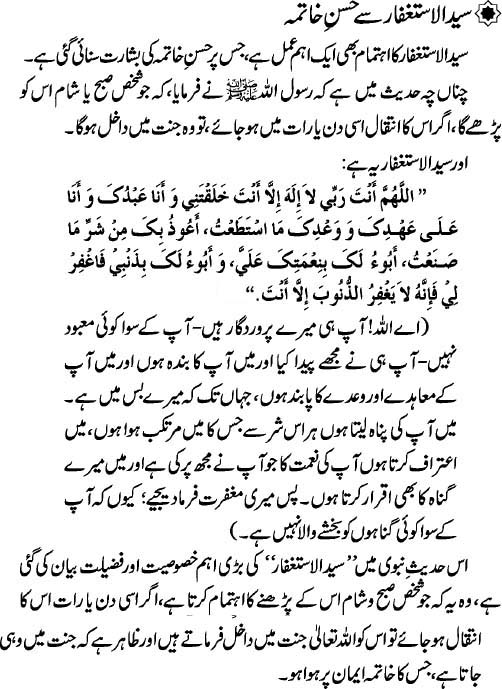
Syed-ul-Istighfar Say Husn e Khatma
Ten Manners In Islam
Praise be to Allah, we seek His help and His forgiveness. We seek refuge with Allah from the evil of our souls and our bad deeds. Whomsoever Allah guides will never be led astray, and whomsoever Allah leaves astray, no one can guide. I bear witness that there is no god but Allah, and I bear witness that Muhammad is His slave and Messenger.
1. Praying for someone who does good to you
Praying for the one who treats you kindly by saying Jazak Allahu khayran
It was narrated that Usamah ibn Zayd (may Allah be pleased with him) said: The Messenger of Allah (peace be upon him) said: “Whoever has a favor done for him and says to the one who did it, ‘Jazak Allaahu khayran’ has done enough to thank him.
2. Shaking hands with the opposite gender
It is not permissible for a man to shake the hands of a non-mahram woman.
Narrated Maqal ibn Yassaar (may Allah be pleased with him) who said: The Messenger of Allah (peace be upon him) said: “If one of you were to be struck in the head with an iron needle, it would be better for him than if he were to touch a woman he is not allowed to.”
3. Drinking
It is permissible to drink; however, it is better to drink while sitting.
Narrated Abu Hurayrah (may Allah be pleased with him): Allah’s Messenger (peace be upon him) said: “None of you should drink while standing; and if anyone forgets, he must vomit.”
Narrated Ibn ‘Abbas (may Allah be pleased with him): “The Prophet (peace be upon him) drank Zam-Zam (water) while standing.”[6]
Narrated An-Nazzal (may Allah be pleased with him): Ali came to the gate of the courtyard (of the Mosque) and drank (water) while he was standing and said, “Some people dislike to drink while standing, but I saw the Prophet (peace be upon him) doing (drinking water) as you have seen me doing now.”
Imam Nawawee (may Allah have mercy on him) said: “There is no contradiction in these ahaadeeth, praise be to Allah, and none of them are daeef (weak). Rather, they are all saheeh. The correct view is that the forbidding mentioned in them is to be understood as meaning that it is disliked. The fact that the Prophet (peace and blessings of Allah be upon him) drank whilst standing indicates that it is permissible to do so. This is all that needs to be said on the matter.”
Naikion Mein Sabqat

Naikion Mein Sabqat
No Obedience For Evil Deeds
[Hadith, Bukhari, Book #91, Hadith #363]
Narrated Ali: The Prophet sent an army and appointed some men their commander. The man made a fire and then said (to the soldiers), “Enter it.” Some of them intended to enter it while some others said, ‘We have run away from it (i.e., embraced Islam to save ourselves from the ‘fire’).” They mentioned that to the Prophet, and he said about people who had intended to enter the fire. ”If they had entered it, they would have remained in it till the Day of Resurrection.” Then he said to others, “No obedience for evil deeds, obedience is required only for what is good.”
[Hadith, Muslim, Book #020, Hadith#4536]
It has been narrated on the authority of All who said: The Messenger of Allah (may peace be upon him) sent an expedition and appointed over the Mujahids a man from the Ansar. (While making the appointment), He ordered that his work should be listened to and obeyed. They made him angry in a matter. He said: Collect for me dry wood. They collected it for him. Then he said: Kindle a fire. They kindled (the fire). Then he said: Didn’t the Messenger of Allah (may peace be upon him) order you to listen to me and obey (my orders)? They said: Yes. He said: Enter the fire. The narrator says: (At this), they began to look at one another and said: We fled from the fire to (find refuge with) the Messenger of Allah (may peace be upon him) (and now you order us to enter it). They stood quietly until his anger cooled down, and the fire went out. When they returned, they related the incident to the Messenger of Allah (may peace be upon him). He said: If they had entered it, they would not have come out. Obedience (to the commander) is obligatory only in what is good.
Sumayyah (RA) Umm Ammar RA Ki Shahadat
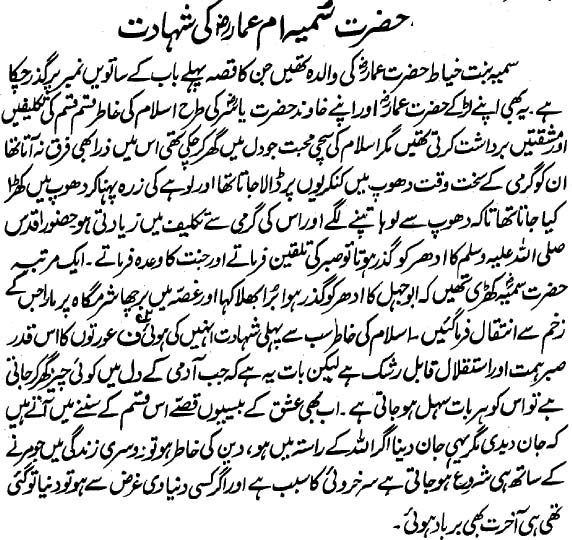
Sumayyah (RA) Umm Ammar RA Ki Shahadat
Husband and Wife Relationship
In the name of Allah, the Most Merciful, the All-Compassionate
“May the Peace and Blessings of Allah be Upon You”
Praise be to Allah, we seek His help and His forgiveness. We seek refuge with Allah from the evil of our souls and our bad deeds.
Whomsoever Allah guides will never be led astray, and whomsoever Allah leaves astray, no one can guide. I bear witness that there is no god but Allah, and I bear witness that Muhammad is His slave and Messenger.
God says in the Quran, “And among His Signs is this, that He created for you mates from among yourselves, that you may dwell in tranquility with them, and He has put love and mercy between your (hearts): verily in that are Signs for those who reflect.” [30:21]
“O you who believe! You are forbidden to inherit women against their will. Nor should you treat them with harshness, that you may take away part of the dower you have given them, -except where they have been guilty of open lewdness; on the contrary, live with them on a footing of kindness and equity. If you dislike them, it may be that you dislike a thing, and God brings about through it a great deal of good.” [4:19]
Marriage brings happiness and security to both the husband and the wife. This helps create feelings of love and mercy towards each other. It helps in creating a healthy society with qualities of love, respect, and honor. Marriages for the purpose of pleasing God result in a family that is steadfast and complete.
Prophet Mohammad (peace be upon him) repeatedly emphasized the importance of treating the spouse with utmost
love and respect. Some of his sayings in this regard are “The best of you is the best one to his family.” [Al Tabarani]
“One should not hate his believing wife. If he dislikes some of her attitudes, he would (surely) like other (attitudes).” [Muslim]
Fear God in (treating) women. [Muslim]
Be advised to treat women righteously. [Al-Bukhari & Muslim]
“Know that no charity that you give, whether small or large, for the sake of God, but you will be rewarded for it, even the bite (of food) that you put in your wife’s mouth.” [Bukhari & Muslim]
Both the husband and wife have certain rights and responsibilities to make the marriage successful. In the above outline of the view of marriage in Islam, men and women are completely equal partners except in the following respects:
Both parties have equal responsibility to provide physical, emotional, psychological, and spiritual happiness
to each other, but men generally have the added responsibility to provide for the economic needs of the wife.
The Quran states, “For Muslim men and women, for believing men and women, for devout men and women,
for true men and women, for men and women who are patient and constant, for men and women who humble themselves, for men and women who give in charity, for men and women who fast (and deny themselves), for men and women who guard their chastity, and for men and women who engage much in God’s praise — for them has God prepared forgiveness and great reward.” [33:35]
As Man is considered the head of the family in Islam, it is beneficial if he has the final say in economic matters and matters that affect the family. However, it does not mean that the husband can behave like a dictator. Muslims are advised by God to consult one another and make decisions in a democratic way (although we need not conduct elections in the house…)
If he does not care for the feelings of his wife and does as he pleases without following Islam and the way of the Prophet, then he is putting his relationship in danger, and God forbid, it might even lead to divorce.
The Muslim woman as a wife and a mother has a very high status in Islam. The wife is expected to agree and follow the husband, only when his decisions agree with the Quran and the Hadith (way) of the Prophet (peace be upon him). If the husband is wrong according to the Quran and hadith, then it is the responsibility of the wife to correct him with wisdom and show him the correct way.
Who wouldn’t be happy to have such a wife who loves you and corrects you when you make a mistake? If a husband is happy with his wife, it indicates that the wife is indeed a loving woman who follows Islam and will be rewarded by God for her efforts with Paradise.
If the husband is angry with his wife for not doing something that is against Islam, then there is no blame on the wife. The wife may be rewarded even more by God because she was able to hold on to her correct beliefs.
- October, 22
- 299
- Human Rights
- More

